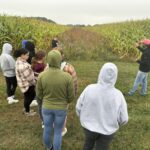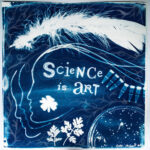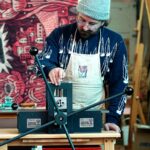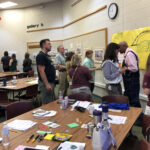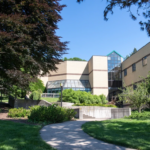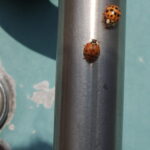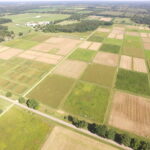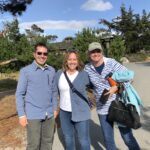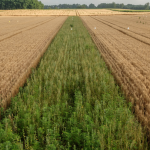BUCHANAN, MI - Buchanan Community Schools proudly announces that Melissa Frost, esteemed educator and dedicated science teacher of Buchanan High School, has been honored as the Michigan Department of Education’s Region 7 Teacher of the Year for the academic year 2024-2025. The Teacher of the Year program, organized by the Michigan Department of Education, aims to recognize and celebrate outstanding educators who demonstrate exemplary dedication to their profession and make significant contributions to the field of education. Melissa Frost exemplifies these qualities through her unwavering
Buchanan students visit KBS LTER and Kellogg Bird Sanctuary with RET Melissa Frost
Throughout 2022 and 2023, Melissa Frost, biology and chemistry teacher at Buchanan High School, joined the KBS LTER through our Research Experience for Teacher (RET) program. The NSF-funded RET program partners teachers with scientists to assist in ongoing research in the lab, as well as providing the teacher the opportunity to develop their own research project. Melissa joined Sarah Evan's lab, and worked with scientists Jennifer Jones and Caitlin Broderick. Melissa embraced the RET as a chance to integrate more research and data into her teaching. "Participating in a RET program allowed
Combine art and science in a sun print workshop at the Kellogg Bird Sanctuary
Augusta, Mich. — An upcoming workshop, hosted at the W.K. Kellogg Bird Sanctuary, will blend art and science into a beautiful sun print piece. Callie Chappell, an artist, science communicator, scientist, and a 2023 artist-in-residence with the KBS Long-term Ecological Research program, will lead the workshop, set for 11 a.m. to 1 p.m. Saturday, July 29, at the Sanctuary. Participants will be encouraged to bring culturally or personally significant materials with them for use in the project. The workshop will begin with a short walk through the
2023 KBS LTER Artist-in-Residence set for June 12-18
A Kalamazoo woodcut printmaker and teacher is the 2023 Artist-in-Residence for Michigan State University’s W.K. Kellogg Biological Station in Hickory Corners, Michigan. Launched by MSU in Summer 2022 in an effort to promote art and science collaborations, the Farmscapes to Forests: Kellogg Biological Station (KBS) Long-Term Ecological Research (LTER) Artist-in-Residence Program is now in its second year and will host Trevor Grabill from Flat Mountain Press June 12-18 as the 2023 Artist-in-Residence. According to Gretel Van Wieren, Professor of Religious
Area educators invited to Kellogg Biological Station K-12 Partnership’s Summer Institute
Hickory Corners, Mich. — Teachers and informal educators of K-12 students are invited to engage in science teaching professional development this summer at the W.K. Kellogg Biological Station. The 24th annual K-12 Partnership Summer Institute is set for 9 a.m. to 3:30 p.m. Tuesday, June 20, through Thursday, June 22. Registration is now open! This year’s theme is “Our Changing Planet, Classrooms to Ecosystems,” and will include scientific talks by Dr. David Karowe, Dr. Lauren Sullivan and Naim Edwards. Each morning’s science talk will be followed by a series of interactive and
KBS commitment to to fostering an inclusive culture garners accolades from MSU
W.K. Kellogg Biological Station’s dedication to making diversity, equity, inclusion and social justice central to KBS culture has earned an Excellence in Diversity, Equity and Inclusion unit award from Michigan State University. The award focuses on the work of the KBS Culture and Inclusion Committee, or CIC, and its 2022 membership: Among the examples of KBS’s contributions to advancing diversity, equity and inclusion were the formation of the CIC, a focus on diverse hiring and recruitment practices, creation of a DEI advocate position, and the development of programming aimed at
Similar invasive insects coexist through slight differences in environmental responses
Novel analyses of a 31-year dataset on invading ladybeetles shows that small differences in habitat preference across years allow for two similar invading species to coexist while native species decline. Invasive species lead to novel interactions Invasive species are one of the main threats to biodiversity in an increasingly interconnected world. As humans move organisms around, either purposefully or incidentally, new combinations of species have the opportunity to interact with one another. These novel interactions have the potential to affect an invader’s persistence in the
KBS Long-Term Ecological Research program awarded $7.65 million NSF grant
The W.K. Kellogg Biological Station Long-Term Ecological Research program at Michigan State University recently received a renewal of its foundational grant from the National Science Foundation, reaffirming its future and status as one of the country’s premier research sites. Established in 1989, the KBS LTER is one of 28 NSF LTER sites nationally and is the only one dedicated to understanding the ecology of agricultural systems. With a focus on row crops, the 34-year-old program studies how agriculture can be environmentally friendly without harming yields. A renewal
Building relationships by the ocean
Britney Christensen, Gabe Knowles, and Connie High joined the KBS community through the NSF LTER RET Program (National Science Foundation’s Research Experience for Teachers). This program matches K-12 teachers with local scientists with the goal of enhancing the professional development of K-12 science educators through research experience in order to then bring new knowledge into their classroom. Their experience culminated with a visit to Asilomar, California to attend the LTER Network's All Scientists Meeting in 2022. The following post is written by Britney, Gabe, and Connie, along
Little strips of prairie can go a long way
New research out of MSU shows that it is possible to manage farmland to address two challenges simultaneously – protecting biodiversity and maintaining ecosystem services. The key is to strategically place native perennial vegetation within agricultural systems, using the innovative practice of prairie strips. Today, 38% of the landscape in the Midwest is planted in row crop agriculture. “We need to make this land habitable for species for the ecosystem services the increased biodiversity can provide to the farms” said Lindsey Kemmerling, the first author of the MSU-led study
- 1
- 2
- 3
- …
- 5
- Next Page »

